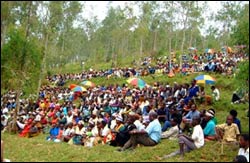Reason to Reconcile
In Ruhashya, a hamlet in the southern province of Butare, a dozen young couples are gathered to be married in a civil ceremony. The brides are wearing circlets of white pearls in their hair. The young men are in their best suits and ties. But before the wedding begins, there's another matter to take care of.
A crowd of about 700 people-including children and old folks-sit on the ground. Some hold striped umbrellas against the strong midday sun. As the wedding guests stand by, twenty young men in pink uniforms are brought from the local prison. They're here for one of the first trial gacacas.
| |

Citizens observe Gacaca proceedings in Gitirama. Photo: Rwanda staff, Internews |
In the center of the crowd, a prosecutor from Kigali stands in white shirtsleeves. "We're here to tell the truth about the prisoners who might have acted in the genocide," he explains. "If we hear of anyone threatening a witness, they will be punished. So even if you're sitting next to someone who participated in the killing, stand up and testify. And if there is somebody in prison who has done nothing, you should also say that, and we will let him go home."
One by one, the prisoners are brought forward, and people stand and tell what they saw or heard eight years ago. Stories of murdered children, a young man who killed his teacher. Complicated details are argued back and forth. Some of the witnesses are jeered and laughed at, including a woman who everyone says is crazy from grief because of her dead children.
Finally, the most dramatic moment of the day: a sobbing woman accuses one of the prisoners of killing her child. But a young man comes forward and says the boy is innocent. He knows because the real killer is his own brother, who is at home. Another witness agrees. A policeman is dispatched to arrest the elder brother, and the boy who has been in prison since 1994 is set free. He rolls on the grass laughing and runs across the field giving high-fives to the other prisoners. This afternoon, five of the prisoners are released on the spot. The other twenty are sent back to prison. Some who confessed will be released early. Others will have to stand trial in a regular courtroom, and could be executed.
As the gacacas begin in earnest this summer, human rights groups will be watching. One concern is that the prisoners' dossiers are prepared by the government, but there are no defense attorneys.
Justice Tharcisse says he knows many in the West are disturbed by the lack of "due process," but he says that, "Gacaca is a much more perfect system in the sense that its mission is much greater than what trial by jury does. It reconciles the community with the suspect. You are talking about large numbers of who are traumatized, who are suspected, who are weakened by genocide. Now without truth, everyone is apprehensive, suspicious of the other. A society that lives in suspicion is not a society that develops."
Next: "The whole country is full of these things, these crosses." 

